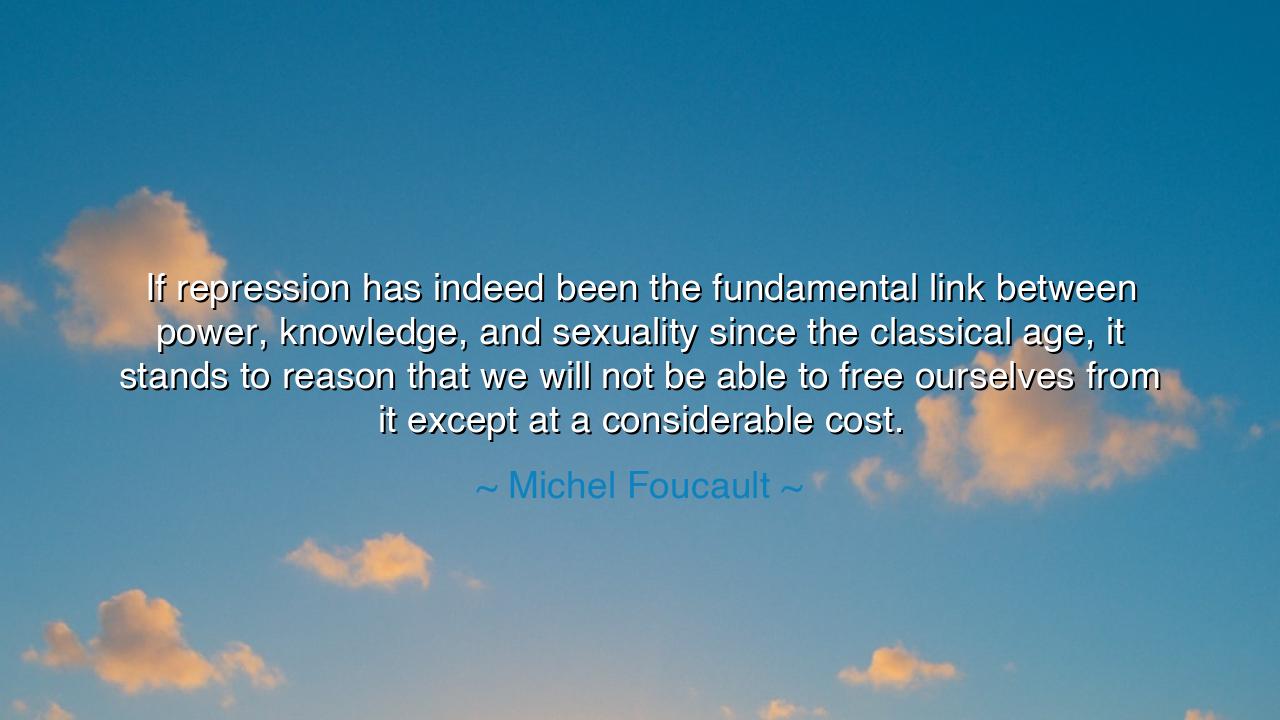
If repression has indeed been the fundamental link between power
If repression has indeed been the fundamental link between power, knowledge, and sexuality since the classical age, it stands to reason that we will not be able to free ourselves from it except at a considerable cost.






“If repression has indeed been the fundamental link between power, knowledge, and sexuality since the classical age, it stands to reason that we will not be able to free ourselves from it except at a considerable cost.” Thus spoke Michel Foucault, the philosopher of shadows — one who peered into the hidden chambers of civilization and revealed how power does not merely command, but shapes the very truths by which we live. In this sentence, Foucault warns us of the deep entanglement between power, knowledge, and repression — forces that have danced together since the dawn of modern society. His words are not those of condemnation alone, but of tragic wisdom: that freedom, when sought from the forces that define us, must be purchased with pain, upheaval, and sacrifice.
Foucault, writing in his History of Sexuality, sought to expose a grand illusion. The modern world, he argued, prides itself on having liberated human beings — from superstition, from tyranny, from the chains of silence that once bound the body and the mind. Yet, beneath this freedom lies a paradox. The more we speak of liberation, the more subtly we are controlled. The more knowledge we gain — of ourselves, of desire, of nature — the more deeply we are woven into systems of surveillance and discipline. Power, he says, does not simply repress; it produces knowledge, and in producing it, defines what is permitted to be said, thought, and even desired. To rebel against repression, then, is not to step outside it — it is to challenge the very architecture of modern life.
When Foucault speaks of repression, he refers not only to moral restraint or censorship, but to the silent shaping of souls — the way societies mold our inner lives in the name of order, reason, or virtue. Since the classical age, he claims, power has hidden behind masks: religion, science, law, psychiatry. Each claims to know us — to diagnose, to define, to guide. Yet this knowing gaze is itself a form of control. The one who defines you owns a piece of you. And so, Foucault warns, the struggle to free ourselves from repression is not merely a political or social act — it is a battle against the very mechanisms that produce our sense of identity and truth.
Consider, as an echo of his insight, the Victorian era — a time often imagined as the age of prudery and restraint. To the outward eye, sexuality was repressed: modesty, silence, and morality ruled. Yet, beneath the surface, society was obsessed with what it forbade. Scientists, doctors, and priests spoke endlessly about desire, studying it, categorizing it, diagnosing it. Every whisper of repression gave rise to new knowledge, and every new piece of knowledge deepened the hold of power. Thus, what seemed like silence was, in truth, an explosion of discourse — the binding of freedom beneath the guise of progress. The very act of speaking of liberation, Foucault would say, became another form of control.
And so, he warns, to free ourselves from this ancient web will not come cheaply. To challenge repression is to challenge the foundation of civilization’s self-understanding — to strike at the roots of how power legitimizes itself through knowledge. Every revolution that has sought to unshackle human life — whether the Enlightenment, the sexual revolution, or the digital age — has brought both awakening and turmoil. The cost of freedom, as Foucault teaches, is not merely social upheaval, but existential disorientation. To break free from repression is to lose the comforting illusions of order and to confront the raw truth of our condition — that we are creatures of both power and desire, always shaping and being shaped.
Yet there is a quiet heroism in Foucault’s warning. He does not tell us to despair, but to awaken. He reminds us that awareness itself is the beginning of liberation. To see how power operates through knowledge is to weaken its invisible chains. To understand how our desires are molded by institutions — families, schools, media, even science — is to reclaim a measure of autonomy. But he does not flatter us: the journey to freedom is not one of comfort. It demands that we question even our most sacred truths, that we bear the considerable cost of unlearning what society has taught us to believe about ourselves.
So, my listener, let this be the lesson: freedom is not the absence of repression, but the courage to face it. It is the long labor of peeling away the layers of what others have told us we must be, to find the pulse of who we are. Beware of the easy freedom that is handed to you, for it may be another form of bondage. Seek instead the hard freedom — the one born of inquiry, resistance, and the acceptance that the self is never fully complete. Like the philosopher, learn to dwell in the discomfort of truth, for only there is the soul made real.
In the end, Foucault’s words are both a mirror and a map. They reflect the struggle of every age that has sought to be free, and they chart the perilous path toward genuine liberation. To challenge repression is to stand against the architecture of power itself — to risk being broken in order to become whole. And though the price is great, the reward is greater still: a life lived not in the shadow of control, but in the radiance of self-awareness, where the human spirit — though scarred and trembling — walks at last in the light of its own becoming.






AAdministratorAdministrator
Welcome, honored guests. Please leave a comment, we will respond soon